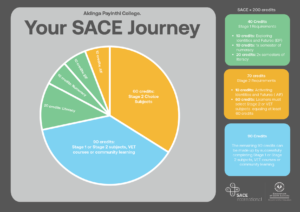South Australian Certificate of Education (SACE)
The South Australian Certificate of Education (SACE) is an internationally recognised qualification which supports learners to gain or extend the knowledge and skills to help them in their future study and employment and to move from college to work, or further training and study. It is designed to equip learners with the skills, knowledge and personal capabilities to successfully participate in society.
By completing their SACE, learners are prepared for further studies, work and life by building essential skills in literacy and numeracy and developing their capabilities. These are the skills learners will use to successfully deal with many situations at work, home, and in their broader community.
Additionally, the SACE is the main method used by South Australian learners to gain admission into university and TAFE courses. TAFE SA also recognises the SACE as meeting the Course Admission Requirements for most of its courses.
Personal Capabilities
The seven key personal capabilities are embedded in the curriculum, from the earliest years of schooling through the Australian Curriculum, and learners continue developing these capabilities through the SACE. The capabilities are:
Numeracy | Literacy | Information and Communication Technology | Intercultural Understanding |
Learners develop Mathematics to effectively interpret information and solve problems.
| Learners develop skills to understand and interpret a variety of texts and people in a range of different situations. | Learners develop their technology skills to allow them to communicate both locally and globally and compete in a global employment market. | Learners develop an appreciation for social and cultural backgrounds during which they learn about the diversity of our nation and the world. |
Critical and Creative Thinking | Personal and Social | Ethical Understanding | For further information about the general capabilities: |
Learners develop critical and creative thinking skills which are some of the most sought-after skills across every workplace. | Learners develop skills to ensure they are confident, self-disciplined and independent along with building their resilience and learning the skills to work as a team. | Learners develop a deep understanding of ethical issues and consider cultural, social, and environmental transformations that are changing the world. |
How to achieve the SACE
Many learners will follow a standard path to achieve their SACE. This is most often in two stages, and for most learners, undertaken as Stage 1 (year 11) and Stage 2 (year 12).
In order to achieve the SACE, the following requirements must be completed to a C grade, or higher.
Subject | Overview | Stage 1 | Stage 2 |
Exploring Identities and Futures | Exploring who you are and who you want to be | Compulsory Subject 10 credits at Stage 1 level
| |
English | From a range of English subjects | Compulsory Subject 20 credits at Stage 1 or Stage 2 2 semesters (1 year) of English | English is a CHOICE SUBJECT and learners may choose to study English at Stage 2 |
Mathematics | From a range of Mathematics subjects | Compulsory Subject
| Maths is a CHOICE SUBJECT learners may choose to study Maths at Stage 2 |
Activating Identities and Futures | Learning when you are not being taught; knowing what to do when I don’t know what to do | Compulsory Subject 1 semester of Activating Identities and Futures NOTE: completed in advance during year 11 | |
Learners complete approximately 120 credits by the end of Year 11 and a minimum of 60 Stage 2 credits in Year 12. The final credits are achieved through successful completion of other Stage 1 or 2 subjects or VET courses. | |||
Please note that not all SACE courses can be offered at a single site and will be programmed based on viability after course selection indicates learner choice. Options to access specific course requirements to meet learners’ future pathways can be discussed on an individual basis.

How to access support
Special provisions are available if a learner has a disability, illness, experiences misadventure, or an unforeseen circumstance which significantly impacts their ability to participate in an assessment. Learners need to provide evidence of how their condition impacts their ability to access assessment conditions. On approval, reasonable adjustments are made. Special provisions can be discussed with Head of Senior Years, Amanda Baldock and Director of Belonging: Inclusion, Intervention and Wellbeing, Jessica Mason.
For some learners with barriers to learning that significantly impact access to the curriculum, the SACE Board makes available a set of modified courses. Modified courses are highly individualised courses in which curriculum and assessment are designed around development of one or more SACE capabilities and personal learning goals that are individualised according to the functional need of the learner.
Additional ways to earn SACE points
Learners are able to earn additional SACE points through Community-developed Programs and Self-directed Community Learning.
- Community-developed Programs include programs that have been approved by SACE and are awarded SACE Credits equating to the training and learning undertaken by learners. For example, Youth Opportunities (offered in year 9 at APC), the Bronze Medallion, the Duke of Edinburgh’s International Award, SA Country Fire Service).
- Self-directed Community Learning is gained through informal community activities, such as coaching a sports team, being the primary carer of a family member, or leading an environmental project in the community. Learners will need to provide evidence of their learning for assessment for the SACE Board to recognise and award SACE credits.
Where can SACE information be found?
SACE Students Online allows learners to:
- plan their SACE and explore different courses and subject and course combinations
- check their progress towards completing the SACE
- access their final SACE results at the end of year 12
SACE learners log in to Students Online using their SACE registration number and PIN at SACE Students Online
For further SACE information
Contact Connect teachers, the Head of Senior Years, Amanda Baldock, or the Leader of VET and Careers Pathways, Sally Vaughan, about study options.
For further information, visit the SACE website.
Information for tertiary pathways




